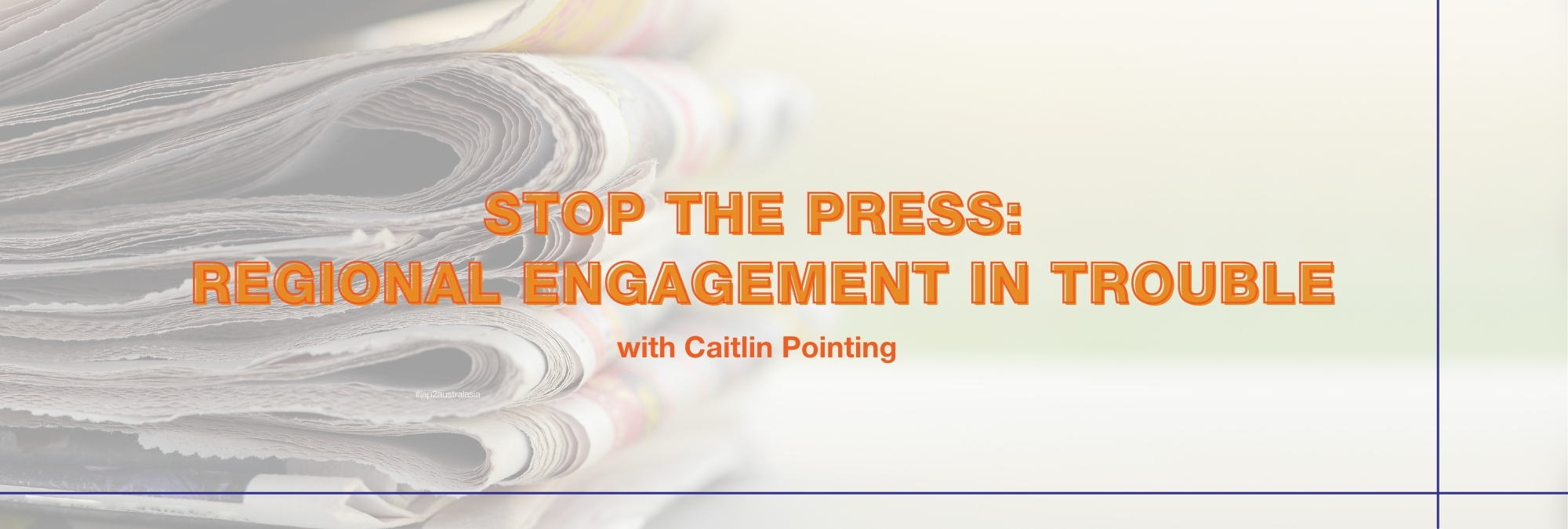Stop the press: Regional engagement in trouble

With Caitlin Pointing, Senior Communications Officer, Rockhampton Regional Council
In the beef capital of Australia, 26 miles from the Queensland coastline, the world has changed.
We have gone from working in offices to working at home, from large scale in-person engagements to dynamic online engagement forums; and many regional towns have lost the local media that has been used as a reliable engagement method for decades.
Engagement practitioners have been forced to pivot in order to remain relevant and continue to engage with communities.
All over the world we have seen a decline in media coverage and thousands of journalists and media professionals have lost their jobs.
But perhaps the most difficult change for Rockhampton, was the beginning of the end of local media.
Our history changed forever in 2020, along with so many towns in Regional Australia, when local media began to be less.
Our 159 year old masthead that survived depressions and wars, covered Royal visits and triumphs of the human spirit, wrote its own obituary and shut down the printing presses.
Months later, a locally produced television news bulletin that has been relied upon by Rockhampton for over 40 years faded to black for the last time.
Like many Australians, Rockhampton residents have grown up with the local TV bulletin in their living rooms and waking up to the local paper on their lawn each morning. The community, young and old, is so deeply entrenched in their local news that this change has been one of the hardest to accept for the community, and one that they are still grappling with.
Through natural disasters, triumphs and heartbreak, the Central Queensland city has relied on their local media to guide the way and be their beacon of truth.
With the last local bulletin being broadcast and the local paper turning to digital only, Rockhampton residents are at a loss of where to turn, and this makes engaging with this deep rooted community particularly challenging.
With the feel of newspaper gone and far away news reports in living rooms instead of vox pops in the mall, how can we engage with our community when they feel that no one is listening?
The challenge now for us as engagement professionals is how do we engage with a community who has literally grown up with local media in their living rooms and at their kitchen tables, and who refuse to accept the fact that local media might be at its last crossroad?
This is a question we have been asking ourselves since 2020, when local media began to disappear in the Beef Capital.
But it’s not just Rockhampton that is struggling with this change.
‘News deserts’ have been increasing throughout the country at an alarming rate; a phenomenon where communities have little to no news coverage. A recent national survey of almost 4,200 regional Australian newspaper readers found that 71% of regional audiences prefer to read their local paper in print rather than online, with 86% viewing a printed paper as an essential service for their community (The Conversation, 2021).
So, what has this meant for the world of community engagement, particularly for local governments in regional areas?
With a major reduction in local media, we have been faced with a number of challenges when trying to undertake engagement activities in this new and seemingly unchartered media landscape, particularly when it comes to communicating our engagement activities to the community via a trusted, far-reaching source.
With the demise of our local media, our Council has increasingly relied on communicating our own stories and news from our website and social media. Without the scrutiny and investigative reporting from journalists how will we hold local members accountable? How do we ensure all members of the community are being reached?
Research by everyone from the Harvard Business Review to Cardiff University, shows that communities with less local media have far lower levels of civic engagement and political accountability than those with a healthy spread of local media.
Research also tells us that local media plays a unique role that metropolitan media does not fill, and local media contributes to cohesion and a sense of community.
As a local government, these studies can’t help but spark concerns relating to the broader engagement of the community, and how this can be done successfully in the absence of local media.
Local government relies on local media to provide detailed information relating to relevant engagement opportunities to assist the community to make informed decisions that form the foundations of a strong democratic process.
IAP2 believes that when engagement is done well it increases trust in the democratic process, so how do we build this trust back up without local media?
Unfortunately this is something that we are still trying to navigate. Although we don’t have the solution yet, we are confident that with some creativity, perspective and persistence, we will find a solution that works for our community that will take them forward for another 100+ years.
Although our world has changed, if there is one thing we know for sure, it’s that engagement professionals are nothing if not resilient and adaptive to change, and it is up to us to rise to the challenge that we are faced with.
Caitlin Pointing is a Senior Communications Officer with Rockhampton Regional Council. Her role is a mixture of all areas of communications that she enjoys – media, marketing, community education and community engagement. Caitlin fell into the world of community engagement after looking for a change from her career in HR and hasn’t looked back since.
